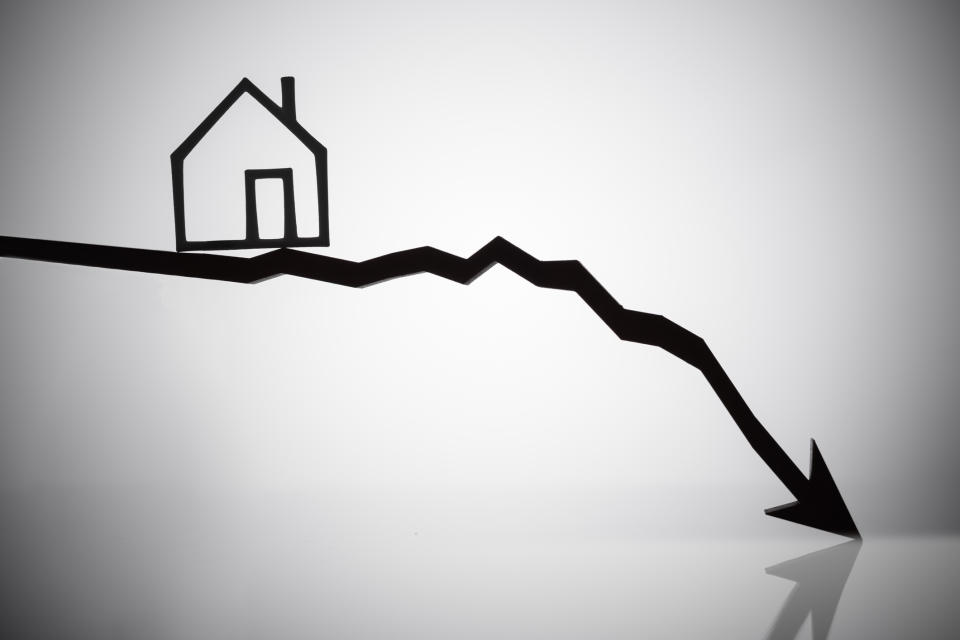10 reasons not to be spooked by a housing collapse

Property and prices is a national obsession and we’re all ‘experts’.
Trouble is that this has led many Aussies to critique expert economists like myself – who have spent decades studying the Australian economy, the real estate market and their reactions to interest rates, wages, Government policies, consumer confidence, etc. – reducing them to ‘hot air merchants’.
I persist with my view that the 40 per cent price fall scare is unfounded.
Here are 10 reasons why you don’t need to be spooked about a house price Armageddon.
1. Accurately predicted 10-15 per cent fall are a far cry from 40 per cent
Experts from the likes of BIS Oxford Economics and Deloitte Access Economics have predictions that Sydney and Melbourne property prices will fall from top to bottom by 10-15 per cent.
BISOE are closer to 10 per cent, while Access’s Chris Richardson might be closer to 15 per cent.
AMP Capital’s Shane Oliver was at 10-15 per cent but has moved to 15-20 per cent but say for Sydney, there has already been a 7-8 per cent fall. As you can see, these numbers are a long way from 40 per cent and Armageddon-ville.
2. The Aussie economy is actually growing faster than 3 per cent
Even the IMF thinks we have two years of 3 per cent plus growth ahead. If people don’t lose their jobs, then they should be able to pay off their home loans. And as growth leads to more jobs, this should create more buyers at auctions and open houses.
3. The US economic outlook is strong and the earliest credible prediction of a US recession is 2020
This implies Wall Street should avoid crashing for at least a year, possibly two. And of course, a stock market collapse could rock consumer confidence and feed on to house prices locally.
That said, market crashes can spark a flight to quality and property fits that bill. This happened with the 1987 stock market crash.
4. This chart showing how we get corrections but not crashes

Even when unemployment went to 10.4 per cent in the 1990-91 recession, our price fall was around 5 per cent. That said, the 10 per cent fall with the end of negative gearing in 1985 is a worry.
5. Interest rate rises from the Reserve Bank are expected until late 2019 or even 2020
So the likelihood of mortgage repayments scaring off homeowners and homebuyers is unlikely for at least two to three years.
6. P&I loans are cheaper than interest-only loans
There’s a lot of scary stories around about people going off interest only loans and being forced into principal and interest loans but my research shows that these loan rates are actually lower than interest only loans and the monthly repayments can be lower!
That shocked me and we don’t know how many people are involved and it isn’t likely they’ll be kicked off their interest only loan all in one go. And the RBA, who should know about this, aren’t stressed about this.
7. Our household-debt-to-income number is very high
Those worried about our exposure to home loans always point to our household-debt-to-income number, which is very high, even on global standards.
Also, as a country, we have more households as landlords, compared to similar countries where companies hold most of the rental stock.
That means a lot of these indebted households are helped by the tax office. All up, our household-to-income numbers are not quite as internationally scary as they look when we’re compared to similar countries.
8. Australian banks are well capitalised and profitable
The RBA’s Assistant Governor said this five days ago: “Australian banks are well capitalised and profitable, and have sound lending standards and plenty of liquid assets. The major banks are already very close to meeting the Australian Prudential Regulation Authority’s unquestionably strong capital benchmarks. This is good for the resilience of the banking sector in the face of any downturn.”
If the banks looked dodgy, that could be a trigger for a house price problem but the RBA says the opposite is the case.
9. The worst is nearly over
Moody’s, which always looks for reasons to downgrade governments and banks, in June predicted that the worst was over for house price falls in Sydney and Melbourne.
I think they’re wrong and we’ll see some more falls but I can’t see them being terribly wrong.
Also, as Chris Richardson from Deloitte points out, our population growth will also help stop prices falling too heavily.
10. Australians are economically rational
Australians can’t easily be compared to other countries when it comes to home ownership. Our full recourse loans and our passion for property make it hard to look at price-to-income ratios like you might for stocks and say what we’re paying is irrational.
We are irrational when it comes to property, like those who have been buying Amazon, Netflix and Facebook on ridiculous values.
But many of the people who have overpaid will stick with their properties, as long as they can make their payments.
Many who have negative equity won’t know it unless they try to sell it. Being economically rational about what we’ve paid for property shows you don’t understand we Aussies when it comes to our beloved quarter acre block or trendy inner-city apartment.
Make your money work with Yahoo Finance’s daily newsletter. Sign up here and stay on top of the latest money, news and tech news.

 Yahoo Finance
Yahoo Finance 
